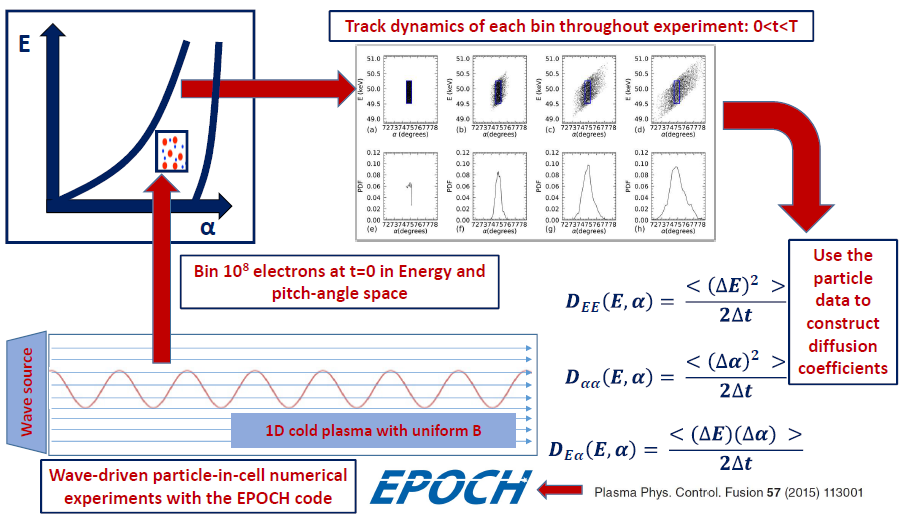MIST
Magnetosphere, Ionosphere and Solar-Terrestrial
Electron Diffusion by Wave-Particle Interactions in the Radiation Belt
By Oliver Allanson (University of Reading)
The Earth's outer radiation belt is a dynamic and extended radiation environment within the inner magnetosphere, composed of energetic plasma that is trapped by the geomagnetic field. The size and location of the outer radiation belt varies dramatically in response to solar wind variability - orders of magnitude changes in the electron flux can occur on short timescales (~hours). However, it is very challenging to accurately predict, or model, fluxes within the radiation belt. This is a pressing concern given the hundreds of satellites that orbit within this hazardous environment, and so the prediction of its variability is a key goal of the magnetospheric space weather community (e.g. see Horne et al., 2013).
Most physics-based computer models of particle dynamics in the radiation belts rely upon the assumption of slow perturbations to electron distributions due to interactions with low amplitude electromagnetic waves. However, satellite observations have shown that high amplitude waves and correspondingly large changes in electron distributions are not rare (e.g. see a recent example with observations from the ARASE satellite in Kurita et al., 2018). In our novel electromagnetic particle-in-cell numerical experiments, we analyse the diffusion in energy and pitch angle space of 100 million individual high-energy electrons in conditions typical of the radiation belt environment - due to interactions with externally driven electromagnetic waves. The method is illustrated in Figure 1. We present two main conclusions:
(i) On very short timescales (~0.1 second) we observe an initial ‘anomalous’ electron response, for which the rate of diffusion is nonlinear in time.
(ii) After the initial transient phase we observe a normal diffusive response that is consistent with quasilinear theory.

Figure 1: A schematic illustrating the particle-in-cell numerical experiment.
The results demonstrate the exciting capabilities of our new experimental technique. Here we prove the concept for conditions that are unlikely to deviate from standard theory, and in future experiments this framework will allow us to investigate the changing nature of the electron response with increased electromagnetic wave amplitude.
For more information, please see the paper:
Allanson, O., Watt, C. E. J., Ratcliffe, H., Meredith, N. P., Allison, H. J., Bentley, S. N., et al. ( 2019). Particle‐in‐cell experiments examine electron diffusion by whistler‐mode waves: 1. Benchmarking with a cold plasma. Journal of Geophysical Research: Space Physics, 124. https://doi.org/10.1029/2019JA027088